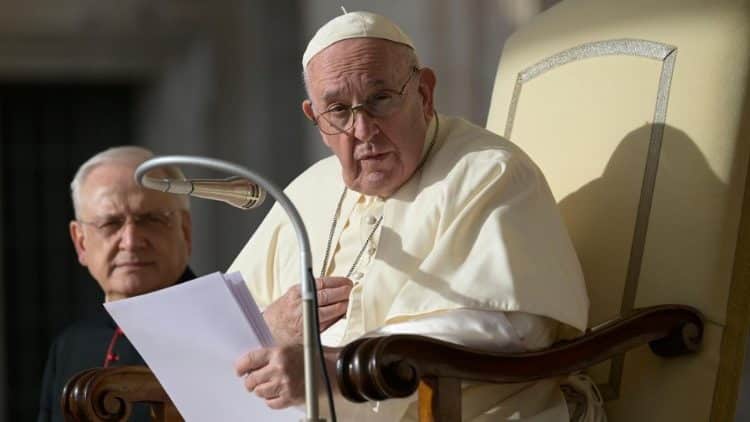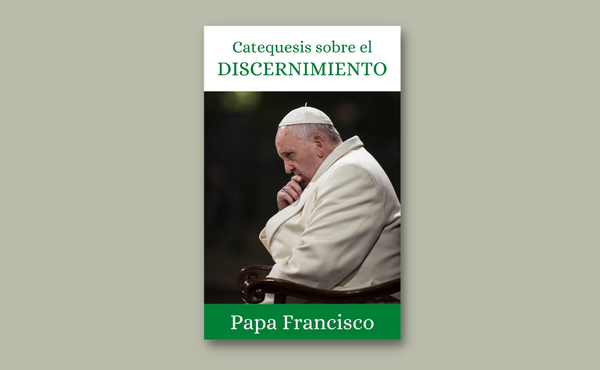
He has paid special attention to the importance of the affections in the examination of conscience and in prayer. It does not refer, therefore, to the role of accompaniment or spiritual direction, except in the last general audience; nor does it refer to discernment at other social or ecclesial levels.
We all need to know how to discern to make the right decisions. This is proper to the virtue of prudence, although today this term has acquired a reductive sense of caution or precaution. But prudence itself is "right reason in acting" and, therefore, it can also lead us to act without delay and with generosity.
From the Christian point of view, moreover, discernment requires taking into account our condition as children of God, friendship and personal contact with Jesus Christ, and the action of the Holy Spirit.
The Pope encouraged knowing how to recognize the signs We must also learn to perceive something that can make us worse along the way, even if it presents itself in an attractive way.
In the first part of his catecheses (up to and including October 19) Pope Francis pointed out four main elements of this spiritual discernment that we could call "individual".
First, the friendship or familiarity with the Lord: to speak with Him in prayer, with closeness and trust, because He never abandons us.
Second, the self-knowledgeThis is not easy, because we tend, on the one hand, to hide - even from ourselves - and, on the other hand, we are easily carried away by superficial fashions or slogans.
For all this, it helps to do the following examination of conscience. And the Pope is not referring here to the examination prior to sacramental confession (to discover the sins of which we are to be accused), but to the general examination of conscience at the end of the day. The general examination of conscience at the end of the day: "What has happened in my heart this day? Many things happened... Which ones, why, what traces did they leave in my heart?
The third 'ingredient' of discernment would be to know what and how the our wishes, We must make sure that our desires are great and operative, because sometimes we remain in our complaints (cf. Jn 5:6 ff), which rather dwarf or atrophy our desire.
Fourth, he advises us reading or interpreting one's own history. If we do this, a little every day, we will be able to detect so many toxic or pessimistic elements that hold us back (I am worthless, everything goes wrong for me, etc.), perhaps with the help of someone who can help us to also recognize our qualities, the good things that God sows in us.

Pope Francis' audience on September 28, 2022. Source: Vatican News.
In a second part of the catechesis (until November 23), he focused on the binomial desolation-consolation.
First, the desolation or spiritual sadness. This sadness need not be bad in itself. Sometimes it is the result of remorse for having done something wrong, but other times it is simply like a "pain in the soul", a red light, which invites us to stop, to see what is wrong; at other times it can be a temptation of discouragement, which the devil sends us to stop us on the path of good.
In any case, it is advisable to ask yourself where it comes from that sadness, without forgetting that God never abandons us, and that with him we can overcome every temptation, as Jesus taught us (cf. Mt 3:14-15; 4:11-11; 16:21-23).
The Pope insists that sometimes such desolation can be good. "In fact," he warns, "if there is not a little dissatisfaction, a little healthy sadness, a healthy capacity to live solitude and to be with ourselves without running away, we run the risk of always remaining on the surface of things, and never getting in touch with the center of our existence. A certain 'healthy restlessness' is a good thing as the saints have had".

And he explains that the desolation gives us the opportunity for growthWe need to mature in the capacity to give ourselves freely to others, without seeking our own interests or our own well-being. For example, in prayer we may be dry or feel empty or tempted to abandon it. But we must learn to be with the Lord, while we continue to seek him, perhaps in the midst of that temptation, or that emptiness that we experience. But without leaving prayer, because his answer always comes.
There are also 'consolations' in the spiritual life, joys. But it is necessary to know distinguishing true from false consolations. The first ones lead us to continue seeking the Lord, grateful for what he gives us. The second are those that lead us to seek ourselves, to evade our duties or to mistreat others.
In the last part of the catechesis (from December 7) Francis invited us to look at the phase after the decisions have been made, to verify whether they have been adequate or not. As signs that they have been good decisions, pointed out: inner peace and joy, concern for the needs of others, "feeling in one's own place", growth in order, unity and energy in our spiritual life.
He added the importance of surveillanceWe must not become drowsy, not get used to it, not let ourselves be carried away by routine (cf. Lk. 12:35-37). This is necessary to ensure perseverance, consistency and the good fruit of our decisions.
The reason is because he who becomes too sure of himself loses humility and through lack of vigilance of heart can let the evil one back in (cf. Mt 12:44 ff). If left unattended, weeds grow: pride, the presumption of being good, the comfort of being at ease, excessive self-confidence... In a word, the lack of humility... and you end up losing everything.
This is the advice: "Watch over your heart, because vigilance is a sign of wisdom, it is a sign above all of humility, because we are afraid of falling and humility is the master path of the Christian life".
Later the Pope pointed out some aids to discernment. He referred mainly to thehe Word of God and the doctrine of the Church. The Word of God is found in Sacred Scripture (especially in the assiduous reading of the Gospels) with the help of the Holy Spirit.
This is why Francis insists, as he has done on other occasions: "Let us take the Gospel, let us take the Bible in our hands: five minutes a day, no more. Carries a pocket GospelIt's a good idea to keep it in your bag, and when you travel, take it and read it a little during the day, letting the Word of God come close to your heart".
He also alluded, in accordance with the experience of the saints, to the importance of contemplate the passion of the Lord and view it in the Crucifixto the use of the Virgin Mary; to ask for lights to the Holy Spirit (which is "discernment in action") and treat it with confidence, together with the Father and the Son.
In the last catechesis (cfr. General Audience of January 4, 2023) Francis pointed out the importance of the spiritual guidance and to make oneself known in order to know oneself and to walk in the spiritual life.
Mr. Ramiro Pellitero IglesiasProfessor of Pastoral Theology at the Faculty of Theology of the University of Navarra.
Published in "Church and New Evangelization". This text (revised on January 4, 2023) is a synthesis of a more complete one, published in the magazine "Omnes", January 2023 issue.